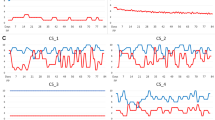Abstract
The study was conducted to examine the changes of first-time mothers’ psychiatric health status, social support, marital intimacy, postpartum stress, and maternal attachment during the transition to motherhood. A repeated measures study was conducted at the 36th week pregnancy, the first week postpartum, and the fourth week postpartum with 217 primiparous women. The results showed that the proportion of women with minor psychiatric morbidity declined over time from late pregnancy to early postpartum. The levels of marital intimacy and social support was the highest at the fourth week and the first week postpartum, respectively. Maternal attachment increased and postpartum stress decreased from the first week to fourth week postpartum. Women with minor psychiatric morbidity reported significantly higher postpartum stress than women without minor psychiatric morbidity. Identifying women with psychiatric morbidity in advance, and providing social support during late pregnancy would be effective strategies to enhance first-time mothers’ adjustment to the transition of motherhood.
Similar content being viewed by others
References
Chen, F. M., & Li, T. S. (2007). Marital enqing: An examination of its relationship to spousal contributions, sacrifices, and family stress in Chinese marriages. The Journal of Social Psychology, 147(4), 393–412.
Chen, T. A., Wu, J. T., Chong, M. Y., & William, P. (1990). Internal consistency and factor structure of the Chinese Health Questionnaire. Acta Psychiatrica Scandinavica, 82(4), 304–308.
Cheng, T. A., & Williams, P. (1986). The design and development of a screening questionnaire (CHQ) for use in community studies of mental disorders in Taiwan. Psychological Medicine, 16(2), 415–422.
Doss, B. D., Rhoades, G. K., Stanley, S. M., & Markman, H. J. (2009). The effect of the transition to parenthood on relationship quality: An 8-year prospective study. Journal of Personality and Social Psychology, 96(3), 601–619.
Goldstein, L. H., Diener, M. L., & Mangelsdorf, S. C. (1996). Maternal characteristics and social support across the transition to motherhood: Associations with maternal behavior. Journal of Family Psychology, 10(1), 60–71.
Grote, N. K., Bridge, J. A., Gavin, A. R., Melville, J. L., Lyengar, S., & Katon, W. J. (2010). A meta-analysis of depression during pregnancy and the risk of preterm birth, low birth weight, and intrauterine growth restriction. Archives of General Psychiatry, 67(10), 1012–1024.
Hui Choi, W. H., Lee, G. L., Chan, C. H. Y., Cheung, R. Y. H., Lee, I. L. Y., & Chan, C. L. W. (2012). The relationships of social support, uncertainty, self-efficacy, and commitment to prenatal psychosocial adaptation. Journal of Advanced Nursing, 68(12), 2633–2645.
Hung, C. H. (2001). The effects of postpartum stress and social support on postpartum women’s health status. Journal of Advanced Nursing, 36(5), 676–684. doi:10.1046/j.1365-2648.2001.02032.x.
Hung, C. H. (2004). Predictors of postpartum women’s health status. Journal of Nursing Scholarship, 36(4), 345–351.
Hung, C. H. (2005). Measuring postpartum stress. Journal of Advanced Nursing, 50(4), 417–424.
Hung, C. H. (2007a). Postpartum stress as a predictor of women’s minor psychiatric morbidity. Community Mental Health Journal, 43(1), 1–12.
Hung, C. H. (2007b). Psychosocial features at different periods after childbirth. The Kaohsiung Journal of Medical Science, 23(2), 71–79.
Krieg, D. B. (2007). Does motherhood get easier the second-time around? Examining parenting stress and marital quality among mothers having their first or second child. Parenting: Science and Practice, 7(2), 149–175.
Kuscu, M. K., Akman, I., Karabekiroglu, A., Yurdakul, Z., Orhan, L., Ozdemir, N., et al. (2008). Early adverse emotional response to childbirth in Turkey: The impact of maternal attachment styles and family support. Journal of Psychosomatic Obstetrics and Gynecology, 29(1), 33–38.
Lawrence, E., Rothman, A. D., Cobb, R. J., Rothman, M. T., & Thomas, N. B. (2008). Marital satisfaction across the transition to parenthood. Journal of Family Psychology, 22(1), 41–50.
Leahy-Warren, P., McCarthy, G., & Corcoran, P. (2011). Postnatal depression in first-time mothers: Prevalence and relationships between functional and structural social support at 6 and 12 weeks postpartum. Archives of Psychiatric Nursing, 25(3), 174–184.
Leigh, B., & Milgrom, J. (2008). Risk factors for antenatal depression, postnatal depression, and parenting stress. BioMedCentral Psychiatry, 8(1), 24.
Li, T. S. (1999). Construct and measure of marital intimacy. Formosa Journal of Mental Health, 12(4), 29–51. [In Chinese].
Liou, S., Wang, P., & Chen, C. (2014). Longitudinal study of perinatal maternal stress, depressive symptoms and anxiety. Midwifery, 30(6), 795–801. doi:10.1016/j.midw.2013.11.007.
Muller, M. E. (1994). A questionnaire to measure mother-to-infant attachment. Journal of Nursing Measurement, 2(2), 129–141.
O’Higgins, M., Robers, I. S. J., Glover, V., & Tayler, A. (2013). Mother-child bonding at 1 year; associations with symptoms of postnatal depression and bonding in the first few weeks. Archives of Women’s Mental Health, 16(5), 381–389.
Razure, C., Bruchon-Schweitzer, M., Dupanloup, A., Irion, O., & Epiney, M. (2011). Stressful events, social support and coping strategies of primiparous women during the postpartum period: A qualitative study. Midwifery, 27(2), 237–242.
Smilkstein, G. (1978). The family APGAR: A proposal for a family function test and its use by physicians. The Journal of Family Practice, 6(6), 1231–1239.
Smilkstein, G., Ashworth, C., & Montano, D. (1982). Validity and reliability of the family APGAR as a test of family function. The Journal of Family Practice, 15(2), 303–311.
Stapleton, L. R. T., Schetter, C. D., Westling, E., Rini, C., Glynn, L. M., Hobel, C. J., et al. (2012). Perceived partner support in pregnancy predicts lower maternal and infant distress. Journal of Family Psychology, 26(3), 453–463.
Teti, D. M., Gelfand, D. M., Messinger, D. S., & Russell, I. (1995). Maternal depression and the quality of early attachment: An examination of infants, preschoolers, and their mothers. Developmental Psychology, 31(3), 364–376.
Acknowledgments
This research project was supported by a Grant from the National Science Council, Taiwan (NSC 93-2314-B-037-096).
Conflict of interest
The authors declare no conflict of interest.
Author information
Authors and Affiliations
Corresponding author
Rights and permissions
About this article
Cite this article
Wu, WR., Hung, CH. First-Time Mothers Psychiatric Health Status During the Transition to Motherhood. Community Ment Health J 52, 937–943 (2016). https://doi.org/10.1007/s10597-015-9892-2
Received:
Accepted:
Published:
Issue Date:
DOI: https://doi.org/10.1007/s10597-015-9892-2




